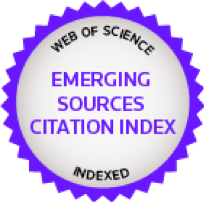 Для выбора русского языка выберите в правом верхнем углу "Russian" и нажмите “Submit”.
Для выбора русского языка выберите в правом верхнем углу "Russian" и нажмите “Submit”.
Web of Science Core Collection (ESCI)
Russian Musicology Scholarly Journal is a peer-reviewed open-access electronic journal publishing theoretical and empirical research in the fields of music studies and music education. The journal welcomes contributions from scholars and practitioners worldwide in the form of original research and review articles, opinion papers and book reviews covering the topics of Russian and foreign music history, contemporary art and musical theater, as well as those of style and genre, poetics, semantics and interpretation of artistic texts. Among other invited themes are art synthesis, ethnomusicology, musical performance and music education.
Since September 2024, Russian Musicology, ISSN 3034-3836 (Online), is the successor to the electronic journal Problemy Muzykal'noi Nauki / Music Scholarship, ISSN 2782-3598 (Online). The journal has been published in English under the title of Russian Musicology.
Founder and Publisher: Gnesin Russian Academy of Music, Moscow, Russian Federation
Main subject areas: Art and Humanities, Cultural Studies, Education
Frequency: Quarterly
Language of publication: English
With the view to encouraging international dialogue, Russian Musicology will provide English translation and linguistic editing support for submissions that have been approved for publication.
Publication fee: The journal supports Platinum Open Access, i.e., no publication fees are charged.
The authors are not charged for English translation. No royalties are paid.
The Journal is included in the List of Peer Reviewed Scientific Journals published by the Higher Attestation Commission (VAK) in which major research results from the dissertations of Candidate of Art (Cand.Sci.) and Doctor of Art (Dr.Sci.) degrees are to be published, in accordance with Paragraph 5 of the Order of the Ministry of Science and Higher Education of the Russian Federation dated May 31, 2023, No. 534.
The journal is included in the Unified State List of Scholarly Publications (USLSP), level 2.
All submissions are subject to anti-plagiarism check and double-blind peer review by at least two specialists in the field. All published articles are assigned a DOI (Digital Object Identifier) number.
The editorial policy of Russian Musicology is based on recommendations of the Committee on Publication Ethics (COPE), the European Association of Science Editors (EASE) and the Association of Scientific Editors and Publishers (ASEP-ANRI).
The publications are indexed in the Russian Index of Science Citation (RINTs).
The journal is covered by international scientific information databases: Web of Science Core Collection (ESCI); Directory of Open Access Journals (DOAJ).
Russian Musicology provides direct open access (platinum model) to its content. The materials are available under the Creative Commons Attribution-NonCommercial-NoDerivatives 4.0 Licence (CC–BY–NC–ND).
Registration Certificate: ЭЛ № ФС 77-78770 from 07.30.2020
Journal website: https://russianmusicology.com
E-mail: rm@gnesin-academy.ru



